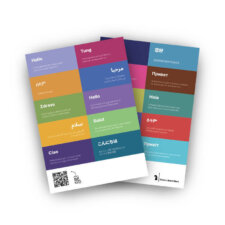Separating Waste / Recycling
Separating waste helps protect the environment and saves money. Reusable waste or waste that is harmful to the environment can be disposed of in special collecting points or at collection stations (paper, batteries, glass, cardboard, compost, aluminium, metall, textiles, oil, etc.). Such waste does not belong in the household rubbish. Every community has its own waste collection schedule (Entsorgungsplan) or rubbish collection calendar (Abfallkalender) which one receives upon moving to a community. Burning waste or dumping it in places that are not designated as collection stations is prohibited. Plastic bottles (PET-Flaschen) and other packaging can be returned to most points of sale.



